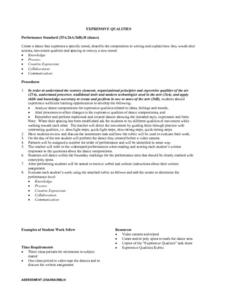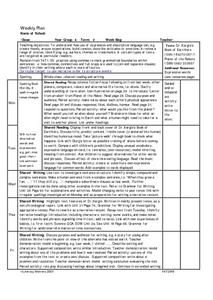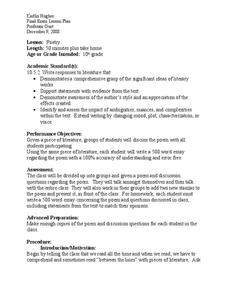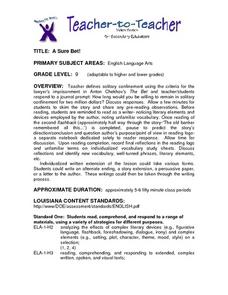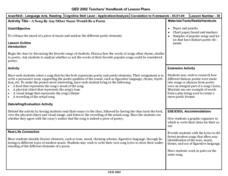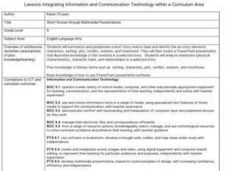Curated OER
EXPRESSIVE QUALITIES
Students create a dance that expresses a specific mood. They describe the composition in writing and explain how they would alter actions, movement qualities and spacing to convey a new mood. They perform the dance they created...
Curated OER
Lots of Lines
Students see that artists make many different kinds of lines. They discuss how artists use line to show ideas such as motion, mood, or emphasis. They geet a "scribble" to transform into a picture using Colorific markers or erasable crayons.
Curated OER
"Dr. Xargle's Book of Earthlets"
Students examine the expressive and descriptive language used in the books "Dr. Xargle's Book of Earthlets" and "Planet of the Robots." In pairs they take notes about each other's physical appearance and conduct interviews, identify the...
Curated OER
Women's Right To Vote
Fifth graders explore the history of women's right to vote and identify two of the leaders of the suffrage movement, Alice Paul and Lucy Burns. After completing readings and discussions, they write an article for the newspaper about...
Curated OER
Language Arts: Stylistic Devices
Students are able to define given literary terms, such as metaphor, simile, imagery, personification, symbolism, etc. They are able to identify the use of literary elements in a given text. Students are able to interpret weather...
Curated OER
The Shakespeare Crowd
Students study the life and times of Shakespeare. They read and analyze one of his plays and use the Internet and videos to gain an understanding of how Shakespeare engaged his audiences, then and still today.
Curated OER
No Regrets: a Poetry Analysis
Students read a poem and use the TPCASTT strategy for analysis. In this poetry analysis lesson plan, students journal about their future goals and read John Updike's "Ex-Basketball Player." Students discuss the purpose of the poem and...
Curated OER
Poetry
Tenth graders write a poem. In this poetry lesson, 10th graders read the poem The Road Not Taken written by Robert Frost, answer discussion questions, add new stanzas to the poem and share them with the class.
Curated OER
Thanksgiving At Plymouth
First graders engage in a holiday celebration of Thanksgiving. They read a play "Thanksgiving At Plymouth" to give the lesson context. The teacher could incorporate costumes and props for a holiday production. After the play they can...
Curated OER
Explore the Elements of Art
Young scholars recognize elements of art such as texture, shape line and color. In this elements of art lesson, students create a still life picture with oil pastel or crayons. Young scholars define elements of art...
Curated OER
Author's Purpose and Point of View Pretest
In this author's purpose and point of view worksheet, students answer 10 multiple choice questions.
Curated OER
Immigration and Photography: The Case of Lewis Hine
Middle schoolers are introduced to the characteristics of documentary photography. Individually, they cut out a paper frame and view their classroom through the "lens" and at different angles. After veiwing photographs, they practice...
Curated OER
Literary Data Collection Chart
Here’s a matrix that could be used with any literary work. For each assigned passage, readers are asked to record information about characters, setting, vocabulary, literary devices, symbols, tone, mood, etc. In addition, they are asked...
Museum of Tolerance
Influence of Media
We are bombarded with media images expressly designed to influence viewers. Learning how to analyze the intended effects of these images is essential and the focus of an activity that asks viewers to use the provided questions to guide...
Curated OER
Create a Video Poem
Collaborate to create a visual version of a poem using video. Before class, choose a poem to pick apart. Read it aloud and then analyze it in detail as a class. Assign a line or short section to each student to expand upon using a...
Curated OER
Poetry: Serve Warmly and More Often
Students identify the mood and theme associated with the language of poetry. They discuss personal interpretation in small groups, and as a class and * experiment with language and rhythm.
Curated OER
Poetry
Fifth graders read several poems by famous poets and identify what about their style makes them unique. They then analyze and compare poetic style, use of forms and themes. Next, 5th graders investigate and collect different examples of...
Curated OER
A Sure Bet!
Ninth graders analyze Chekhov's "The Bet". They repsond to a journal quesiton and use examples from the novel. In groups, they take on different roles analyzing the novel and then write one of my prompts to complete the lesson.
Curated OER
A Song By Any Other Name Would Be a Poem
Students examine the poetic elements of a piece of music. They discuss favorite songs, select a song, and write a persuasive essay identifying the poetic qualities of the song lyrics.
Curated OER
Short Stories Through Multimedia Presentations
Ninth graders summarize and paraphrase a short story read in class. They identify the six story elements of character, setting, plot, conflict, solution, and tone/mood. Students create a PowePoint presentation that illustrates the...
Smithsonian Institution
Giving Speeches: George Washington's First and Second Inaugural Addresses
Learners discuss the purpose of the President of the United States giving an inaugural address. They describe their impressions of any inaugural speaches they have heard or read. Students research events leading up to Washington's first...
Curated OER
Author's Purpose and Point of View Post Test
In this author's purpose and point of view activity, students determine the definition of the terms and identify the author's purpose and point of view in given passages.
Curated OER
"The Necklace" and "Cinderella"
Tenth graders complete literature analysis activities using Guy de Maupassants "The Necklace" and the Grimm Brothers "Cinderella." In this literature analysis lesson, 10th graders discuss the life and career of Guy de Maupassant and...
Curated OER
Reader's Theater, Get Ready
Students recognize what features make a play. In this reader's theater lesson, students read the play Master Man: A Tall Tale of Nigeria told by Aaron Shepard and determine what features make this a play and what the author's purpose was.


